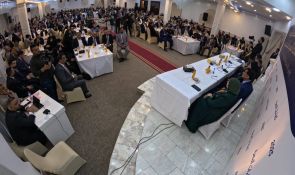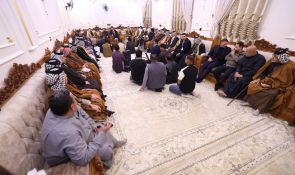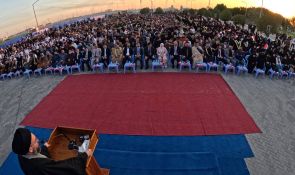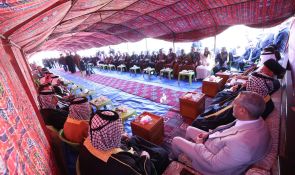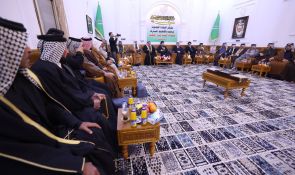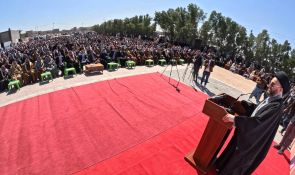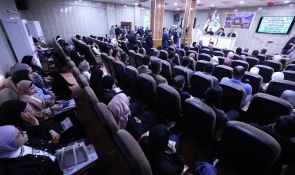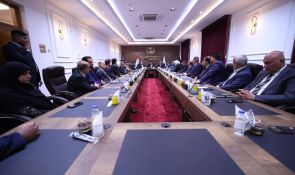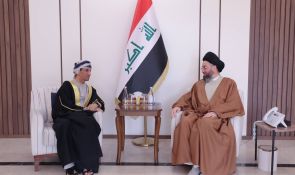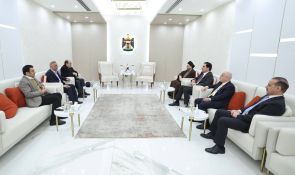Sayyid Ammar Al-Hakeem’s Speech text during the seminar organized by Harvard University / Center for International Studies / via the Zoom app
In the Name of Allah “Most Merciful Most Gracious”
First Question: The Shiites Dialog and the dialog between Sunnis and Shiites
- When we talk about the Shiite-Shiite dialogue or the Shiite-Sunni dialogue or other humanitarian dialogues, we must focus on a very important introduction, which is the concept of dialogue itself and the importance of the dialogue itself.
- Today we live in a world in which humanity is making great and advanced efforts to be characterized by the highest levels of rationality in its methodology, ways of thinking, interrelationships, knowledge, science, behavior, and attitude, which is a joyful matter that separates those human epochs that were characterized by closure and confinement. And the logic of power and between our era that is heading towards openness, dialogue, greater cooperation, and the power of reason.
- In our world today, military power and even economic power is not sufficient to give legitimacy and acceptability to the actions of states, societies, and individuals as it was before, and there is another decisive factor that entered the field a few centuries ago and that is the factor of rationality, thinking, culture and science, and whoever wants to have distinction and acceptability, must not ignore these main and important factors.
- There is no doubt that the concept of dialogue is one of the most important pillars of that desired global rational, when the world opens up to one another, not for the purpose of colonialism, enslavement, and exploitation, but for the purpose of understanding, cooperation and participation in human life management on our small planet in an optimal, safe, and more prosperous manner. And less miserable and selfish.
- – The school of Ahl Al-Bayt, the family of the Islamic Prophet Mohammed “Peace Be Upon Them”, and according to the authentic Qur’anic and prophetic logic, which the school worked to continue and establish in the nation – it took from the path of dialogue, knowledge, wisdom and reflection an approach to openness to people with all their variations, ideologies, doctrines and religions.
- We clearly see that the Holy Qur’an conveys with all openness and transparency the suspicions of the polytheists and the skeptics about its verses that are recited every day and whenever they are answered with proof and argument. This is the religion of the Messenger of Islam and the imams of Ahl Al-Bayt “peace be upon them”, in not being afraid of dialogue and openness to others.
- When we review hundreds or even thousands of noble narrations conveyed from them “PBUT”, we see that they did not oust a class of people from their dialog (from atheists and heretics as they used to be called down to philosophers, reasonable and thinkers, not just followers of religions and leaders of doctrines) In their good, evident and deductive style, which is a very important matter.
- Whoever follows Islamic history finds that there is something like a miracle in the survival, continuation, and growth of the Ahl al-Bayt School “PBUT”, despite all the existential challenges that the school has faced since its inception.
Whereas “Peace Be Upon Them”, did not possess the power, weaponry, money, equipment, or sufficient numbers to defend themselves or their followers in the face of these difficult challenges and them being a target historically due to their belonging to the Ahl al-Bayt (PBUT) school in the long eras of history, and they did not resort to this except for their logic and their cognitive, moral, ethical and spiritual method, which today resulted in hundreds of millions of Shiites, as well as the consensus of Muslims who revere, honor and appreciate these pure figures from the dynasty of the noble Prophet of Islam.
- The Shiites are entrusted with this unique Imami heritage, and they must preserve it and take it as a path in a world that is moving and maturing day after day towards more advanced levels of rationality, dialogue, and cooperation.
- What humanity has reached today, we are proud that it was consecrated, affirmed, and evolved in the Ahl al-Bayt “PBUT” school yesterday, and it should remain present today and tomorrow in the future.
- The approach of Ahl Al-Bayt “PBUT” in opening up to everyone should be a way for the Shiites to open up to the Islamic world in particular and to the world and all of humanity in general, as well as to the Shiite-Shiite dialogue, which must be at the highest levels of understanding and appreciation.
- We must use dialog with others with all of their human diversities from the angle of (commonality, concerns, issues, and common outcomes, as well as respecting, accepting, and understanding the idiosyncrasies). The aim of the dialogue is serious cooperation in reaching the truth as it is (at the level of evaluation) and at the level of equality and "equity" in the words of Ahl al-Bayt “PBUT” (at the level of rights).
- Today, for example, health, environment, security, food, and economy in the world are intertwined and interrelated matters that cannot tolerate human conflict and arguments. As cultures, religions, and idiosyncrasies are issues that concern individuals and societies and their sub-identities greatly, prejudicing these matters is considered prejudice to those major matters. this requires all of us to manage this tremendous diversity and organize it in an accurate, reasonable, and acceptable equation, pushing the world towards convergence and advancement, not conflict and war.
- Our time should be the time of an honored human, the rational human who has no tool to administer except with mechanisms befitting him and his global stature which he obtained with the shed of tears and blood, sacrifices, and painful experiences.
- Starting from this point, dialogue with all its types, levels, and mechanisms becomes an inevitable path, an indispensable necessity, and a priority that is second to none, and the origin from which all the required assets and structures are branched out.
Second Question: The role that interfaith dialogue can play in both Iraq and the Islamic world
- As we mentioned, we see the rational human dialogue is one of the origins of our modern world and certainly on what we have mentioned about the historical precedent of this dialogue in Ahl Al-Bayt School (PBUT) and the availability of religious, intellectual, and Islamic cultural structures for it. We believe it is imperative to revive and activate this approach in Shiite and Islamic circles.
- Many factors have alienated our Islamic world from its origins, constants, and original culture, including:
1- Politics with its internal authoritarianism or colonial external axes.
2- The convulsive and fanatical religious readings.
3- Intellectual, mental and psychological deformations.
4- Low community awareness and culture.
5- Moving away from the spirit of Islam and sticking to the superficial matters.
6- Conflict of interests and internal disputes.
7- Not keeping up with global shifts and variables.
And other factors, all of which were pressing and left their destructive effects on our societies, which were left behind by other global societies, not because of a lack of self in them, but for this huge amount of obstructions and discomforts that it suffered throughout its history.
- Here, I see that it’s imperative to get back to the initiative and revisit the dialogue roundtable by all the Shiite, Islamic, political and intellectual elites in our Islamic world. Not out of courtesy, one-time conventions, politicized conferences, or shiny slogans, but coming from considering dialogue as:
an integral part of our modern world;
and a way to restore Our Islamic civilization;
and a platform for our dialogue with all of humanity.
- If we want our countries to have stability, progress and growth, to have our print in the world in which we live and not to be a liability on anyone in it, but rather respectable, influential and effective partners, secondly we must first conduct dialogues with each other and agree on the formulas produced and thirdly that We open up to the world.
- How much we need to stop conflict and reduce the crisis to nil and remove the historical and mental negative accumulations.
- We must change the world's fear of Muslims into global hope, with the role and existence of Muslims.
- The Islamic unity that we demand is not that unity that seeks to confront the world or to follow it in everything that makes us in the eyes of others fierce enemies or imitators deprived of identity.
- The unity that we call for is that Islamic civilized unity that contains the world and adds to it an original kind that harmonizes with common human issues and concerns and accompanies them and offers them solutions and efficient prescriptions.
- I believe that if we succeeded in transforming the Islamic compass from a state of (hostility, stagnation, and dependency) resulting from the behavior of the propagandists of Islam from extremists, flatterers or closed in on themselves away from the spirit of Islam to the realistic state of (openness, progress, and authenticity) we will save our Islamic world and our countries to which we belong, and we will join the ranks of our great world, to join as a partner, not as a subordinate. To join as an original, not the joining of the imitator. To join as an addition, not an additive.
- The way for that is dialogue, rationality, cognitive development, and maintaining the spiritual-religious-ethical momentum that our world lacks. Serious dialogue that does not only round corners or harmonizes the glittering public words, but rather examines the truth seriously is the way to identify, diagnose and besiege the elements of the imbalance and lay down a serious plan to eliminate them.
- Ahl al-Bayt’s “PBUT” school which is an integral part of our Islamic world and a natural extension of Islam, has the capacity and the cognitive and spiritual infrastructures that qualify the Shiites to be an integral part of this civilized project and journey.
- Politically these days, Iraq is seeking to be a bridge for communication between the countries of the region to restore relations between them, but we aspire to see Iraq as a stable and active country and a civilized bridge between the peoples of the region and its elites soon, Allah’s willing, and we are making great and sincere efforts for that hoping for luck and success.
Third Question: Iraq is home to important religious schools, especially in the holy city of Najaf, and an origin site for a cross-border visit. What do you see of the importance of Shi’ism in the future of Iraq?
- In fact, Iraq is the homeland of the original Shiism 1400 years ago, and it is a formidable concentration of many prominent human, Islamic and Shiite landmarks:
Humanly: Iraq is the home of human civilizations as well as the home of the Prophet Ibrahim Al-Khaleel, the father of the prophets, and the great monotheistic human religions, in addition to the fact that it contains the remains of hundreds of great prophets, in the forefront of whom are: Adam, Noah, Salih, Hood, Job and Zul-Kifl who are mentioned in the Holy Qur’an.
Islamically: It is the land of the Righteous and Islamic Alawite Caliphate, the home and cemetery of the Prophets, the Imams of Ahl Al-Bayt (PBUT), and senior imams and scholars of Islamic schools and Sufi orders, and in the forefront of them are: Imam Abu Hanifa al-Numan, Imam Ahmad bin Hanbal and Sheikh Abdul Qadir Al-Geilany.
Shiite: Iraq has the shrines of 6 imams of the pure Ahl Al-Bayt (Imam Ali bin Abi Talib, Hussein bin Ali, Musa bin Jaafar Al-Kadhum, Mohammad bin Ali Al-Jawad, Ali bin Mohammad Al-Hadi, and al-Hasan bin Ali Al-Askary), Peace Be Upon Them, and the birthplace of the twelfth Imam, Imam Mahdi, the expected.
In addition, the shrines of hundreds of Alawite students from the Hashemite family, led by Imam Zaid bin Ali bin Al-Hussein, may Allah Almighty be pleased with him.
The four Deputies of the Awaited Imam and the most senior Shi'a scholars, Mufid, Al-Kulayni, and al-Tusi final resting place is in Iraq.
- The Shiite Hawza of Iraq in Najaf, Baghdad, Hilla, Karbala, and Samarra are among the oldest and most prestigious Islamic and Shiite Hawza and universities in the world.
- Also, Al-Najaf Al-Ashraf today, with its millennial history, symbolizes all that scientific, knowledge, and religious accumulation.
- Also, Iraq is an original symbol of the Islamic civilization in its first centuries and the time of its scientific and cultural renaissance, and Baghdad, in particular, symbolizes it as the capital of sciences, scholars, literature, culture, and art throughout our Islamic history.
- All these facts and foundations make the location of the Shiites in Iraq an original, rooted, and solid position in the country. The ancient and modern history has proven that the Shiites were and still are the main pillar for the cohesion and unity of Iraq, in the darkest circumstances and the most difficult situations, and this also indicates A prosperous future for them, Allah willing.
- As for the secret of the Shiites’ strength, their roots, and their entrenchment in Iraq, I believe, they are all those ingredients that we mentioned and the following quartet:
1- Religious reference.
2- The Husseini rituals.
3- Internal cohesion.
4- National coexistence.
- In addition to its pioneering religious leadership position in Iraq, the religious reference in Iraq represents social leadership, moderation, management, and historically accumulated knowledge.
- The Shiite religious establishment in Iraq had the most prominent role in the cohesion of the Shiite community and the preservation of its authentic identity, which is one of the elements of the Shiite movement nationally and their peaceful coexistence with other components.
We clearly notice that the religious reference, and despite all the challenges that the Shiites faced in their history of tyranny and dictatorship, never pushed them to work on geographic, political, or social separation from the other components, but on the contrary, they always urged and insisted on the need for the Shiites to open up to their partners and integrate into Their homeland, coexist with other citizens, and have a greater role to welcome everyone and anyone.
- As the reference, with its moderate position and its wise decisions and historical measures, we see it pushed and pushed towards building an Iraqi state in which every Iraqi has a voice and every Iraqi has a decision and every Iraqi has a print in the course and future of his country away from monopoly, tyranny and marginalization policies. But took the side of other sects and religions throughout history starting with the Kurds, Turkmen, Christians, Yazidis, and Sabeans. It established humanitarian and Islamic values in religious and political freedom, recognition of the different other, and the affirmation of the unifying national identity and called for partnership in running the state and not relying on the Shiite majority to monopolize the national decision.
- These attitudes of the religious reference have achieved, throughout history, internal cohesion of the Shiites, and when the majority hold on and is aware of the necessities of societal coexistence, the country holds on to its unity and identity, and this is what’s happening.
- On the other side, the Shiite holding on to the Husseini rituals along history was a major component in their cohesion and their cultural, intellectual, and behavioral evolvement.
- Arbaʽeen Pilgrimage that you mentioned is one of the most important religious pilgrimage of millions, and not the only one. You see millions of pilgrimages to Samarra, Kadhimiya, Najaf, and other shrines as well throughout the year.
Yes, the Arba’een, and because it includes millions of people from outside Iraq, it took the center and brought the world's attention to it.
The attendance of millions from 70-80 countries from around the world annually in a marvelous Husseini carnival that extends for days up to two weeks and the unparalleled free, excellent, and generous hospitality provided by the Iraqi people to the guests of Abu Abdullah Al-Hussein “PBUH”, created a qualitative impression on the Iraqi people that they are generous and generous, moral, Brave, committed and adhering to his moderate and humane values and habits.
- In fact, all of these features are strengths that have qualified the Shiites of Iraq to overcome existential, difficult, and deadly challenges in their history, and there is an imperative to preserve them.
- The future of the Iraqi Shiites depends on their adherence to the Quartet that we mentioned (reference, rituals, unity, national identity).
- Any manipulation of this strategic quartet or any negligence of it will put the Shiites in front of new and deadly dangers and challenges, Allah forbid.
Fourth Question: The impact of pluralism on the future of the Iraqi national identity in light of the tensions of Saddam, the occupation, and ISIS?
- At the outset, I would like to confirm my vision of this diversity and pluralism. Some say or many consider that this diversity represents a weakness for Iraq and Iraqi society and that it is an element that hinders societal cohesion, and from here either attack this diversity with titles (sectarian and racial) or call to overcome this Diversity by jumping to the reality of its existence by promoting that these peculiarities must be eliminated to create national cohesion.
- Personally, I disagree with all these propositions, and visions and consider them wrong and unreal, as this diversity and plurality represent a great strength for Iraq.
- Our world today is a world of diversity and multiplicity, and developed countries today go beyond the concepts of equality to reach the concept of managing diversity and investing it for the benefit of their countries, so why do we abandon this power and not invest it for the benefit of the Iraqi government?
- Personally, I call for the necessity of building the "Iraqi nation" through a trilogy:
1- Respecting idiosyncrasies.
2- Diversity management.
3- Building the unifying national identity.
- Respecting idiosyncrasies means: Yes to sect, no to sectarianism, yes to nationalism, no to racism, yes to religion, no to intolerance.
Being a Shiite or Sunni is not a violation of your patriotism as long as you are loyal to the homeland and its public interests. Rather, it is one of your natural patriotic rights to take what you see as a right path, and that belonging to the doctrine is your decision and your understanding of the truth of Islam and you alone bear its responsibility in your relationship with Allah Almighty. Taking the rights of others and imposing your opinion on them by force, is despicable sectarianism that threatens civil peace and national unity.
To be a Kurdish or Arab and take pride in your dress, holidays, language, and customs, is a natural right that no one disputes with you over it, but if you prefer your nationalism and marginalize others, this is abhorrent and rejected racism.
To be a Muslim, Christian, Sabean, Yezidi, to be religious and committed is your birth right. but forcing others to convert to Islam, Christianity, or other religions and treat others with repugnant nervousness, is unacceptable.
- The solution is not to leap over these identities and idiosyncrasies, but to respect and appreciate them, and to allow freedom for their adherents and their normal religious practice.
- As for managing diversity, we first prevent sectarian, religious, and national retrenchment, setting up high walls around their identities and keeping it to themselves. Secondly, we push these identities to share and cooperate. And thirdly, we invest it in the interest of the state.
Today, the Arabs of Iraq are the gateway to the country for more than 22 Arab countries.
Iraq’s Kurds are the gateway to the Kurds in our neighboring countries Syria, Iran, and Turkey.
Iraq’s Turkmen are the gateway to Turkification, just as the Shiites of Iraq are the gateway to the Shiites of Iran, the Gulf, and the world.
This means the convergence of civilizations and peoples and the closer ties and interests between them, and it does not mean negative interference or meddling in the affairs of others.
- As for the unifying national identity, it is that identity formed from the group of major components and sub-identities that guarantee the interest of all, and are embodied in the one and unified Iraqi nation.
- The previous regime represented the sectarian and racist vision that sought to skip facts, eliminate idiosyncrasies, and monopolize national identity in a single party.
- The same applies to ISIS, which wanted to bring down the borders through an extremist, perverted, and petrified ideology.
- As for the Iraqi people, their choice is clear: coexistence, unity, and cohesion, which is what we must all strive to preserve.
Fifth Question: after 18 years of the Iraq War of 2003, what are the positive and negative developments, and currently, what are the main development and democratic hinders in Iraq?
- In fact, the answer to this vital question in detail needs a lengthy explanation, but briefly:
- Our Islamic and Arab region has not settled for nearly a century on stable formulas of governance systems and clear visions for state management, and the region has attracted disparate and conflicting ideologies and regimes:
Governments in the form of monarchies, sheiks, sultans, and Emirates on the one hand, and governments with military, religious, national, or ideological leaderships in general on the other hand.
- The international influence of world powers in the region has divided it into conflicting loyalties and biases.
- Cross-border national, political, and religious ideologies have divided nations and peoples into conflicting administrative divisions (cantons).
- Tyranny and dictatorship have profoundly created gaps between peoples and governments.
- Militarism, coups, and military ambitions have brought the region into many conflicts and external tensions or internal revolutions and eruptions.
- And Iraq had, in all of the aforementioned, a large share of this tension and loss:
- Iraq has gone through two major occupations in its history during the past 100 years (the British occupation in 1914 and the American occupation in 2003) as well as the regime's biases, sometimes towards these international powers and at other times towards others.
- Iraq also experimented with various forms of regimes (the monarchy and the republic).
- He also experimented with various cross-border ideologies (secular, religious, communist, nationalist, liberal, and Islamic).
- It has also undergone bitter experiences of military coups and exhausting wars in the region as a result of personal or party authoritarian ambitions.
- Iraq has also suffered from despised tyranny and dictatorship for a long period of time.
- All these accumulations and complex problems brought the Iraqi state to a moment of complete disintegration and collapse in 2003, in addition to Iraq's loss of its sovereignty since 1990 as a result of UN decisions and its entry into Chapter VII of the United Nations Charter.
- Therefore, we can compare Iraq in 2003 and the birth of its new democratic system to that weak orphan child born by a complicated Caesarean section under a circumstance of lack of care, vaccinations, and necessary nutrition, and at the mercy of forces who do not care much about his health as much as they care about this child's legacy of money and wealth, On top of all that, this child has been subjected, for 18 years, to violent shocks as a result of the foreign military presence, terrorism, sabotage and interference in his affairs.
- However, despite all these previous existential challenges, Iraq and its authentic, patient, and conscious people were able to overcome 6 post-2003 challenges, which are:
1- The Occupation Challenge
2- The Sectarian Strife Challenge
3- Terrorism Challenge
4- Division Challenge
5- Return to Tyranny Challenge
6- The Collapse of the Democratic Choice Challenge
Each of these challenges nearly led to painful and dire consequences.
- I imagine that the pros achieved by the Iraqi people amid this momentum of great challenges are many, too many, the most important of which is their boldness and courage to move forward in choosing the free democratic system and leaving the eras of tyranny and monopoly on the one hand and regaining the initiative in managing their affairs away from international tutelage on the other hand.
- We are also heading towards 6 important issues to move from the stage of (stopping the negatives, crises, and repercussions) to the stage of accumulating positives and strength and consolidating them, which are:
1- Preserving the 6 achievements that we mentioned and consolidating them further.
2- Building the Iraqi nation.
3- Building the Iraqi state.
4- Building an integrated economic system.
5- Treating the administrative and service weakness.
6- Accomplishing the system of external relations for Iraq.
All of this requires 4 types of management:
1- Managing good governance at the state level;
2- Managing diversity at the social level;
3- Managing ambition at the political level;
4- And managing interests at the regional and international level.
And for this we submitted 3 main initiatives:
1- Calling for a social contract that leads to a new political decade.
2- Calling for the formation of cross-component political alliances.
3- Calling for building the unifying national identity.
Sixth Question: Shiite National Identity? How can one involve Shi’ism with Nationalism? How would this form of nationalism differ from other forms of nationalism that Iraq has experienced in the recent past?
- In fact, the Arab and Islamic countries, in general, faced many challenges regarding the processes of building a unifying national identity after their independence from the Ottoman Empire or the colonial countries.
- These challenges can be summarized in 4 main points:
1- Compatibility between national and religious identity Challenge.
2- Compatibility among diversity, national and sectarian pluralism, and national identity in countries with pluralism Challenge.
3- Compatibility between cross-border ideologies and national identity Challenge
4- Defining the foundations on which the national identity is built on Challenge.
- Many military or authoritarian regimes have taken the path of industrializing and imposing stereotyped and ideological identities on their societies under politicized national or sectarian titles, which increased the problems, new crises that deepened the gap between citizens and their countries and homelands, and did not solve the main problem.
- On the other hand, the region witnessed opposition reactions manifested in skepticism or rejection of those imposed identities, and Islamic or secular theorizing cross-borders came out to abuse the artificial or proposed identities as well.
- The Shiite societies spread in many Arab and Islamic countries and faced, like the rest of the citizens of their countries, duplication of identity and double standards in dealing with them.
- This can be summed up by saying:
- Many of the Shiite minorities in their countries faced campaigns to question their loyalty to their countries and homeland.
- A Shiite majority, like the one in Iraq, faced skepticism about loyalty on the one hand and the threat of its existence on the other hand due to tyranny and dictatorship.
- These equations also culminated in reactions that called the Shiites to international and cross-border theorizing to preserve and defend their presence.
- therefore to solve the problem from its roots, we deliberately raised the issue openly and with clear candor, and this is summarized in:
First: The Shiites in terms of belief and belonging to Ahl al-Bayt school “PBUT”, are united everywhere, and they are proud of that and feel honored.
But in terms of societies, they are geographically, historically, linguistically, and nationally diverse from each other.
They are also, in terms of being individuals, are diverse in their political, cultural, and intellectual affiliations.
Hence, the solution is to preserve the common religious bond of the Shiites and to recognize their social and political diversity. Such as Catholic Christians, for example, as they are citizens of their countries and devotees to the Pope and the Catholic Church, whose global symbolism crosses borders.
Shi'ism, as a doctrine, transcends boundaries and determinants, just like any religion and sect.
But a Shiite, in terms of being an individual or a community, is defined by his historical, national, and geographical circumstances in which he is in.
His belonging to his country, in addition to feelings and emotions, is based on a historical and geographical accumulation and a social and political contract with his other partners, and it is a binding contract by the agreement of all its parties.
- From here we see that the equation is as follows:
Wherever the Shiites are in the majority, they should contain their other partners with their diverse affiliations in their countries as an elder brother and as a bigger partner.
Wherever they are a minority, they must adhere to the rights of citizenship, equal rights and duties with their countries and societies, and strive to win their rights at home, not across borders.
That is why we called for the necessity of the Shiite national identity and its consolidation within the unifying Iraqi national identity, and we believe that the Shiites of Iraq, in particular, are very much attached to this identity:
- The fact that their Islam and Shiism is completely consistent with the geography and history of their country, and there is no opposition to that.
- And the fact that the historical positions of the Shiites of Iraq demonstrate the extent of their adherence to this identity and its defense.
- Also, the absence of dictatorship, militarism, and sectarianism eras threatened their existence and monopolized patriotism for others.
- We put this concept under the spotlight, not in doubt about the patriotism of the Shiites, but rather to consolidate it and liberate it from the accumulations of the past and the defensive mentality entrenched in their midst.
- We believe that the Shiites of Iraq and the region are experiencing a great opportunity to restore their natural roles in their countries, due to the political, intellectual, and psychological changes that the region is going through. And the Shiites should look to invest these opportunities in their countries and to be an active part of them.
- Our advice to all political systems is:
- The necessity to break traditional molds and search for building real national identities, through the equation of rights, duties, and political contracts that are binding and reassuring for all per the principles of citizenship and societal peace.
- The people of the country are more important to them than others, and the homelands do not survive except with their people, and the countries do not settle except with the stability of souls and scripts.
Seventh Question: What role can Iraq play in the Middle East in terms of leadership? How can Iraq be a bridge between different countries and hubs?
- To answer this question, we must talk about 3 axes:
The first axis :
It is the historical and geographical axis: Iraq, with its ancient civilization, its authentic people, and its rich heritage, which constitutes a rich historical memory in the hearts and minds of its people, can rise from its failures and more quickly than other countries.
The existential challenges that we have overcome in the past 17 years are the biggest proof of what we are saying. Each of these challenges will disintegrate entire countries, not be overcome in short periods, just as what happened in Iraq.
Also, the large geography of Iraq and its enormous wealth constitute the foundations and infrastructures available for this rise.
The second axis:
It is the focus of the presence of Iraq. The Iraqis have chosen the most difficult and hardest paths for their present and their future, and it is the path and choice to build a system, a state, and an identity different from their history and the history of their modern region, which is the democratic system, the state, the constitutional and national identity, away from tyranny, authoritarianism and dictatorship.
This option, which is unique in the Arab world and Islam, despite its difficulties, challenges, and hardships, if it succeeds and grows up and matures more quickly than it is, it will be an advanced choice and a deep-rooted and previous experience unique in the region and it is what we hope for and work on.
This experience will allow the Iraqis to have high flexibility in movement, communication, and building balanced relationships and partnerships with the neighboring counties and the world, and it will add additional strength to the country.
The third axis:
It is the axis of the future of Iraq and the region: Iraq is located between 3 important and ancient civilizations, the Persian civilization, the Turkish civilization, and the Arab civilization, with an important internal national, religious and sectarian diversity, which allows it to play important civilizational, political and cultural roles between the civilizations of the region and Their people.
Iraq's civilization, the authenticity of its people, its geographical location, its enormous wealth, its free and flexible system, its peaceful and conscious will, are all components of the strength of Iraq. But it is not that disruptive, destructive, and expansionist force that frightens others, but rather that civilized, economic, and peaceful force that attracts others, contains them, and binds them together.
We want Iraq to be the main station and a tight bridge for all the capabilities of the region through major partnerships and major interests that restore the region's importance, stature, and constructive roles.
Iraq has chosen for itself not to be a tool of sabotage, settling scores, and conflict, but rather as a bridge for communication, interdependence, and construction.
Here I want to end with two messages:
The first: The Shiites represent the majority of the population of Iraq, and there is no stability in this country without the Shiites’ centralization in it, and this is what the other components of Iraq demand as well. There is no stability in the region without Iraq, the historical capital of the region, and the Shiites of Iraq are the key to regional stability.
The Second: The modern political philosophy that produced the modern political system in the world devoid of ideology and which depends on the ballot box and mutual interests can respond to the Shiite political way of thinking in Najaf to create a strong political system in which the region appears in an appearance that secures the participants their interests while building itself according to the principles of modern politics.


